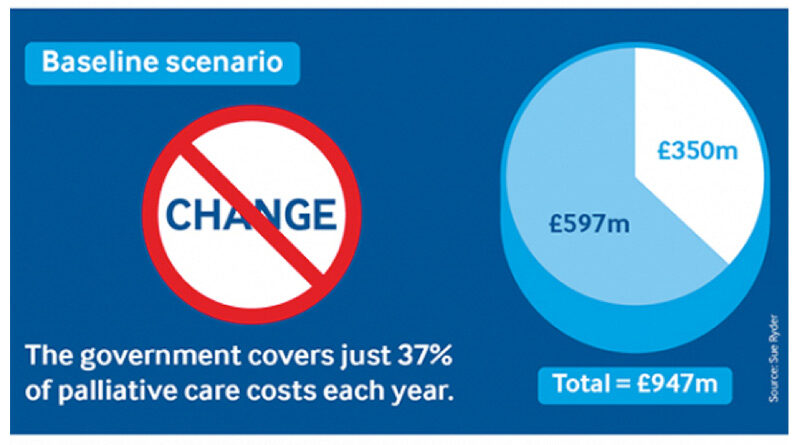It’s Time To End The Hospice Funding Crisis Says Sue Ryder
Sue Ryder, provider of specialist palliative care in England, is calling on the Government to commit to more sustainable funding for the hospice care sector having commissioned an independent report looking into the rise in demand and cost for end of life care services over the next ten years.
The charity says that without a commitment from the government to fund 70 per cent of the costs for the palliative care sector, there is a serious risk it will collapse.
Despite the Health Secretary repeatedly stating in Parliament that the government is committed to investing in ‘high quality palliative care’, no sustainable funding has as yet been forthcoming.
- Currently 245,000 people in England are expected to receive palliative care in the coming year. Sue Ryder’s research shows this is expected to increase to 379,000 people per year by 2030.
- Independent hospices only receive around one third of the money required to fund their end of life services from the government.
- The running costs of the palliative care sector are estimated to be £947 million a year between now and 2030 and if government funding remains the same, the hospice sector will be required to fundraise £597 million every year in order to keep hospices open.
- Sue Ryder is calling on the government to end the funding crisis facing the palliative care sector and commit to covering 70 per cent of the costs of hospice provision.
The statutory funding increase will cost the government an additional £313 million per year. However the alternative, which will most likely see the end of the independent hospice sector, will result in the NHS having to provide end of life care services which would be an additional cost of £484 million each year for the government.
Not only that, the NHS would not have the capacity to provide the same level of specialist holistic support that hospices offer, so patients and their families would lose out.
Heidi Travis, Chief Executive at Sue Ryder, said:
“I think it will come as a surprise to many that their local hospice is reliant on the generosity of members of the public who choose to donate or fundraise.
“Put plainly, in order to pay the salaries of our doctors and nurses who provide expert care, pain and symptom management to people at the end of their lives, we rely on people buying second hand clothes from our charity shops or running a marathon and asking their friends and family for sponsorship. It is unfathomable that such a critical part of our healthcare system is hanging by a thread.
“Whilst the government has provided some one-off funding in the past year to allow hospices to support our NHS during the pandemic, the hospice sector has papered over the cracks for as long as possible. The country’s hospices can no longer operate with ad hoc financial ‘top-ups’ that do not fundamentally address the serious long term funding crisis facing the hospice sector.”
Barbara Keeley, MP for Worsley and Eccles South and member of the Health and Social Care Select Committee, said:
“Hospices are a vital part of our healthcare system, allowing people to spend the end of their lives in a supportive and caring environment with their family and loved ones. Despite this, the Government provides only a third of the funding hospices need to function.
“Essential healthcare services should not be reliant on fundraising and donations from members of the public to remain open. The Government’s approach of offering short term financial packages which are not adequate to the needs of the sector cannot continue.
“Failing to invest in our hospices now risks much-loved institutions closing their doors for good, leaving people without the access to high-quality end-of-life care which they deserve.”





